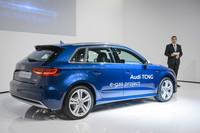Car Maker Audi To Synthesize Sustainable Fuels
SEE ALSO: Real Patriots Use Flex-Fuel Vehicles
By Henny Hemmes
Senior European Editor
The Auto Channel
THE HAGUE, January 8, 2013. In Northern Germany, Audi has an e-gas facility under construction together with system builder SolarFuel. It will be the world’s first facility to convert renewable electricity and CO2 into a synthetic natural gas that can be fed into the natural gas network on an industrial scale.
The facility gets electricity from wind mills nearby to produce hydrogen (from water) by electrolysis and obtains its CO2 from a biogas plant, which is not using energy crop plants, but organic waste. By compressing with CO2 from the atmosphere, a process called methanation, another renewable energy source is created, synthesized renewable methane, or Audi e-gas.
Methane is often produced by the decomposition of organic waste, releasing large quantities of CO2, which are absorbed in the atmosphere. Instead, the CO2 can be stowed to the processing facilities of an e-gas plant, where it is combined with hydrogen to produce even more methane.
From there, the synthetic fuel can be pumped into an existing network of natural gas for use in cars. Or it can be distributed in compressed form through filling stations, or in homes installed pumps. A system that records how much natural gas is tanked by Audi e-gas models at one of thousand gas stations in Germany is under development. The registered quantity will be fed into the network as e-gas.
The e-gas is an energy-rich fuel that is chemically identical to the fossil fuel methane, the primary constituent of natural gas, and it is excellently suited for powering internal combustion engines. According to forecasts, beginning in 2013 the facility in Germany will yearly produce about 1102.31 US tons of methane. In the process it will chemically bond 3086.47 US tons of CO2. That amount of renewably generated Audi e-gas could power 1,500 Audi A3 Sportback TCNG vehicles for 9,320 miles per year in CO2-neutral driving. Audi plans this a bi-fuel model, equipped with a four-cylinder engine that burns both methanol/CNG or petrol this summer and also plans to launch a second TCNG model on the market that is based on the A4 in 2015



